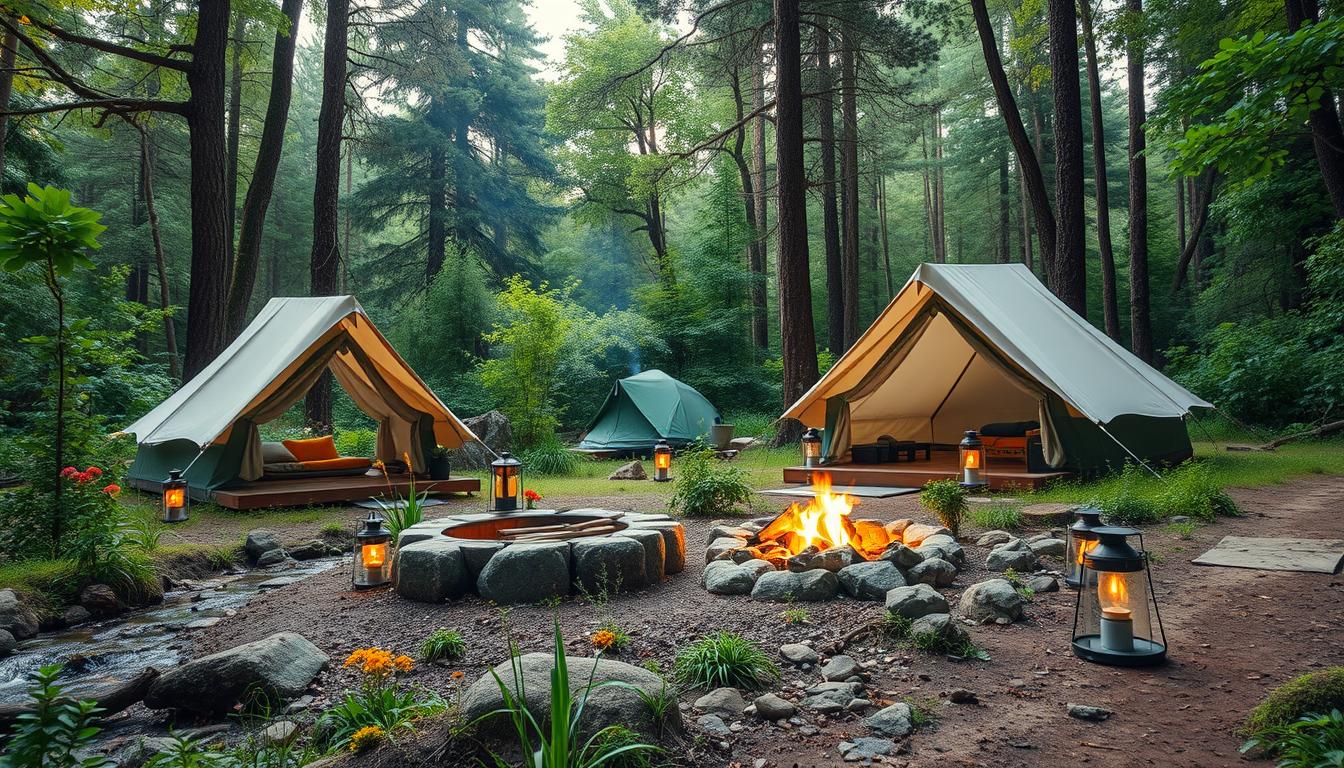Camping is a wonderful way to connect with nature, with nearly 48 million Americans enjoying it every year. It’s important to remember that camping means taking care of the land, water, and air. This makes Responsible Camping Techniques key for Sustainable Outdoor Adventures.
About 75% of outdoor lovers know how to reduce their environmental impact. By using reusable gear and following “Leave No Trace” rules, we can lessen our footprint. This way, we can enjoy Sustainable Outdoor Adventures and keep nature safe for the future.
Planning a trip to Idaho Springs, Colorado? Make sure to book at the Idaho Springs RV Resort & Campground, open all year. Choosing eco-friendly spots and using Responsible Camping Techniques helps us protect nature. This way, we can enjoy the outdoors while keeping it beautiful for generations to come.
Understanding the Importance of Responsible Camping
When we go camping, it’s key to think about how our actions affect the environment. With a 3% increase in outdoor recreation participation from 2020 to 2021, it’s more important than ever to camp responsibly. By following Eco-Friendly Camping Tips and Ethical Wilderness Practices, we can leave the outdoors as beautiful as we found it.
Many campers, about 70%, worry about how camping affects the environment. It’s vital to take steps like disposing of waste properly and not littering. Remember, 40% of camping waste is food scraps and other organic materials that can be handled better.
Practicing responsible camping helps us reduce our environmental footprint and supports local communities. With 75% of campers choosing eco-friendly gear, there’s a clear shift towards sustainable camping. This way, we enjoy nature’s benefits, like better mental health and more wildlife sightings.
As we delve deeper into the importance of camping responsibly, we see our crucial role in protecting nature. By using Eco-Friendly Camping Tips and Ethical Wilderness Practices, we make sure our camping trips are fun and sustainable for everyone in the future.
Planning Your Trip with Sustainability in Mind
When planning a camping trip, think about the environment. Choose eco-friendly campsites and learn about local rules. This way, you can enjoy your trip while being kind to nature. Leave No Trace Principles are a good guide for camping sustainably.
Look for campsites that are easy to get to. This cuts down on travel emissions. Also, pick sites with green practices like recycling and energy-saving facilities.
It’s important to know the local rules and guidelines. These rules help protect nature and wildlife. By planning well, you can make your camping trip more eco-friendly.
Selecting Eco-Friendly Campsites
Choose campsites that care about the environment. Look for places that use green energy, recycle, and follow Leave No Trace Principles. These sites are better for the planet.
Researching Local Regulations and Guidelines
Knowing the local rules is key for a green camping trip. These rules help keep nature and wildlife safe. By planning ahead, you can have a fun and eco-friendly camping adventure.
Eco-Conscious Packing Essentials
Packing for Environmentally Conscious Camping is key to reducing our environmental impact. As we get ready for our trip, we must think about the gear we choose. Sustainable camping gear and less waste help us leave a smaller ecological footprint.
Choosing the right gear depends on the season, where we’re camping, and how long we’ll stay. We must remember to take everything we bring with us. Packing less and using shared gear can cut down on waste and save resources.
Using reusable water bottles and biodegradable soap are big steps towards reducing our environmental impact. Meal planning and proper waste disposal are also important. They help us leave the campsite as we found it.
As we start our camping journey, let’s focus on Environmentally Conscious Camping and follow Green Camping Guidelines. This way, we can enjoy nature while protecting it for the future.
Leave No Trace Principles for Campers
When we go into the great outdoors, our actions matter a lot. By using Responsible Camping Techniques, we can keep the environment clean. The Leave No Trace principles help us do this.
These principles aim to reduce our environmental impact. We can do this by camping on solid ground, throwing away trash right, and not taking things we find. Sustainable Outdoor Adventures mean enjoying nature and keeping it safe for others later.
The Seven Leave No Trace Principles
The seven principles guide us to camp responsibly. They tell us to plan, camp on solid ground, and throw away trash right. They also say to leave things as we found them, keep campfires small, respect wildlife, and think about other campers. Following these helps us have a Sustainable Outdoor Adventure and protect the environment.

How to Apply These Principles While Camping
To follow the Leave No Trace principles, we need to plan and be aware. Being careful with our actions lets us enjoy nature while keeping it safe. Remember, Responsible Camping Techniques are key for a Sustainable Outdoor Adventure.
Sustainable Cooking and Food Practices
Camping can be more eco-friendly with simple changes. Using Eco-Friendly Camping Tips like meal planning and reusable containers cuts down on waste. Buying in bulk and preparing meals ahead of time also helps.
Renewable cooking sources, like solar stoves, are another great choice. They lower our carbon footprint and support Ethical Wilderness Practices. By managing food waste, we keep the wilderness beautiful for others to enjoy.
Reducing Food Waste
Managing food waste is key to a healthy ecosystem. Following Eco-Friendly Camping Tips and Ethical Wilderness Practices reduces landfill waste. Simple actions, like taking out all trash, protect nature.
Promoting Sustainable Cooking
Adopting sustainable cooking in camping makes a big difference. Using solar power and Ethical Wilderness Practices lowers our environmental impact. This ensures a greener future for all.
Wildlife Encounters: Ethical Practices
When we go into the wilderness, we must remember we are guests. Following Leave No Trace Principles and using Low-Impact Camping Strategies helps a lot. Keeping pets in check is key, as they can stress or harm animals. Also, make sure their shots are current to stop disease spread.
Keeping a Safe Distance from Wildlife
It’s best to watch wildlife from far away. This keeps them calm and lets them act naturally. For big animals, keep at least 100 yards away. This way, we all have a better time.

Food Storage Techniques to Protect Animals
Storing food right is a big part of Leave No Trace Principles. Use bear canisters or airtight containers to keep animals away. This keeps the ecosystem balanced and stops animals from relying on human food.
Water Sources and Conservation
Water conservation is key in Environmentally Conscious Camping. It’s important to bring enough water for everyone. If water is hard to find, water filters and purifiers can help.
Research shows we need about 2 to 3 liters of water daily. Using one-pot meals can cut water use by half.
Techniques for Sustainable Water Use
Collecting rainwater can help with water needs. Portable water filters can clean up to 99.99% of harmful stuff from water. Boiling water is another good option when water is scarce.
By following Green Camping Guidelines, we can lessen our environmental impact. This makes camping more sustainable for everyone.
Filtering and Treating Water Responsibly
Using less water for cleaning can save up to 75% of water. Biodegradable soaps are good for the environment, breaking down fast. These steps help keep water available for the future.
Engaging with Local Communities
When we go on Sustainable Outdoor Adventures, we must think about how we affect local communities. Using Responsible Camping Techniques helps us connect with the locals. We can do this by supporting local businesses and services.
This not only helps the local economy but also makes our trip more real. We get to see the area through the eyes of its people.
It’s important to research the traditional lands of Indigenous Peoples before we camp. We should look for local rules and buy camping permits or goods from Indigenous communities. This shows respect and helps the local economy.

By talking to local communities, we learn more about the area’s history and culture. This makes our camping trip better and connects us to the land and people. As we try to leave less of a mark on nature, we also need to build good relationships with the communities we visit.
Supporting Local Businesses and Services
Helping local businesses is a big part of Responsible Camping Techniques. By shopping locally and using local guides, we help the local economy. This also helps protect the area’s nature and culture.
Learning from Indigenous Cultures
Learning from Indigenous cultures is a big part of our camping trip. Understanding the area’s history and traditions helps us appreciate the land and its people more. This enriches our experience and promotes respect and understanding between cultures.
Extending Sustainable Practices Beyond Camping
Being responsible in the outdoors is more than just camping. It’s about living sustainably all year. By choosing eco-friendly options and supporting conservation, we help our planet. This way, we make a bigger difference and ensure a greener future.
Making Responsible Outdoor Choices Year-Round
The lessons from Eco-Friendly Camping Tips and Ethical Wilderness Practices apply to everyday life. We can reduce waste, save water, and support local shops. Every little bit helps in making our world a better place.
Advocating for Environmental Conservation in Your Community
We can do more by supporting environmental causes in our area. This might mean helping out with local groups, speaking up at meetings, or encouraging friends to live sustainably. Together, we can make a big difference and protect the wilderness for future generations.

